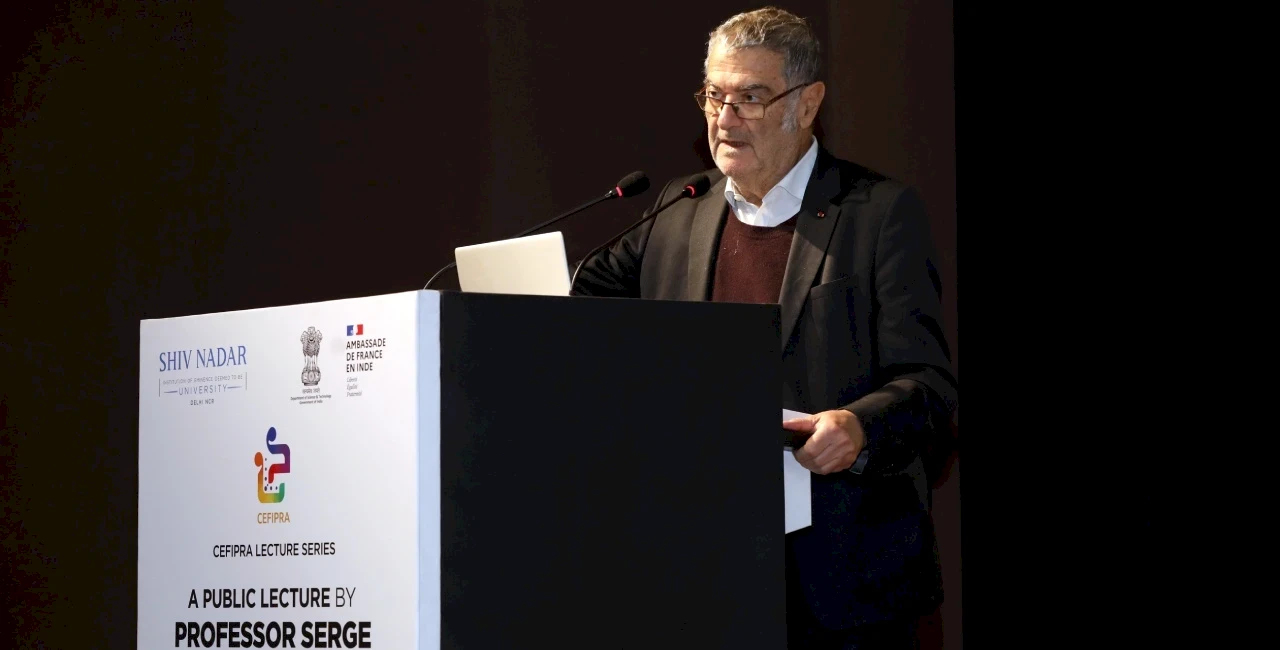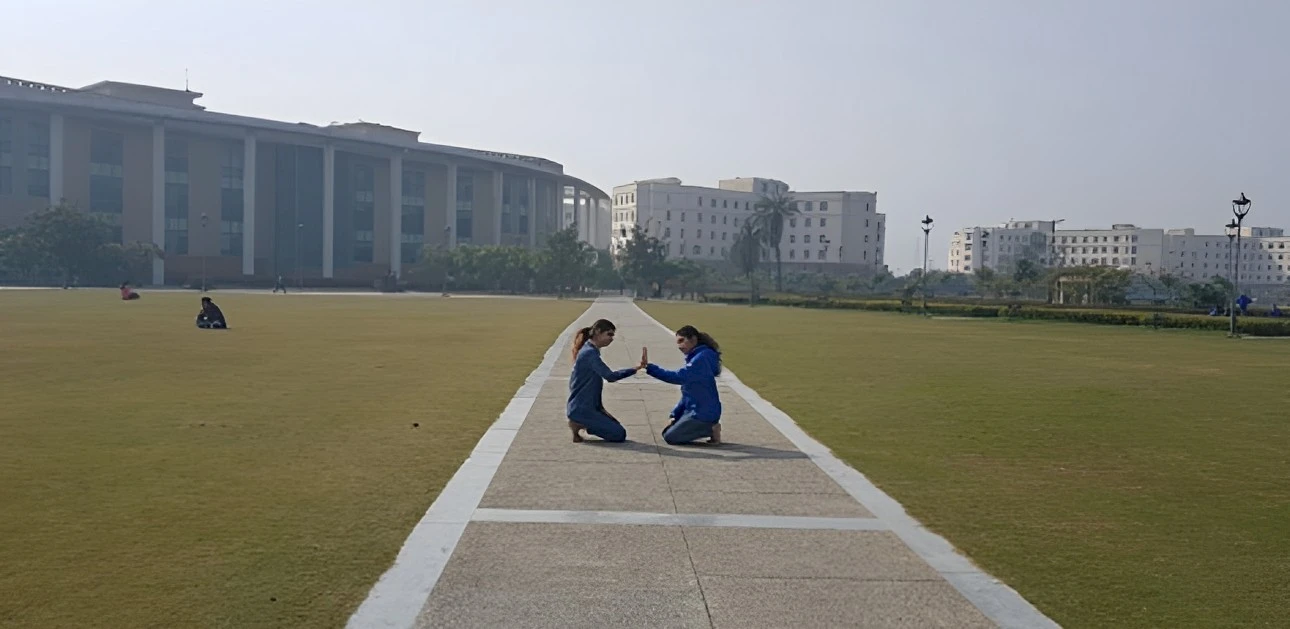A Public Lecture by Professor Serge Haroche, Nobel Laureate in Physics

Editorial / June 23, 2023
NobelPhysicsThe wind-swept crisp spring morning of February 13 at the campus provided the perfect venue to host Professor Serge Haroche, winner of the 2012 Nobel Prize for Physics. The Nobel Laureate treated students, faculty, staff, and guests to an invigorating, thought-provoking lecture in a packed 500-seater auditorium.
Professor Haroche began the lecture by explaining the origins of quantum research. He recalled how the association between Albert Einstein and Indian scientist Satyendra Nath Bose precisely a century ago, in 1923, helped Einstein develop the Bose-Einstein statistics, the cornerstone of quantum research. "This explains the connection between basic and applied science. What Bose-Einstein statistics explained later gave rise to a new field of physics called atomic interferometry."
Professor Haroche spoke at the University as part of a lecture series organized by the Indo-French Centre for the Promotion of Advanced Research (CEFIPRA).
Answering a question from another student on where one should place themselves in the vast, emerging study of quantum physics, Professor Haroche quoted Dr. Arthur Leonard Schawlow, Nobel Prize winner in Physics, under whom he was a visiting post-doctoral student at Stanford University, to say, "The only thing you need to know is what others do not know."
Adding that a career in science combined passion, curiosity, and luck, Professor Haroche said the only shortcut to success was hard work.
Kicking off the lecture, Dr. Ananya Mukherjee, Vice-Chancellor, Shiv Nadar Institution of Eminence, in her welcome address, said that the event marked a special day in the life of the University.
"Research is the backbone of our institution. We aspire to produce research that changes the world and fosters an excitement that is powerful and enduring. Research is integrally built into our curriculum. We are privileged to have a research infrastructure that is rare in the global south, and we are adding to that infrastructure every day to expand an exceptional research environment. As an Institution of Eminence designated by the Government of India, we wish to engage actively in the country's research priorities," said Dr. Mukherjee.
Quashing the hype around the so-called 'Second Quantum Revolution,' Professor Haroche said, "We can rarely predict what the future holds. All we know is that we need to pursue basic science relentlessly. We must be motivated by our curiosity. The applications emerging several years later will undoubtedly surprise us."
Earlier addressing the audience, Dr. Didier Raboisson, Attaché for Scientific Cooperation, Embassy of France in India, said, "CEFIPRA offers €4 million for research between India and France, and we also have a grant of €1.7 million to support student mobility from India to France." He encouraged students and faculty from Indian universities to explore these options for collaborative research.
"Shiv Nadar Institution of Eminence is a young university conceived as a brainchild of research. There is a strong passion towards teaching and research here," said Dr. Nitin Seth, Director CEFIPRA, in his introductory remarks.
Dr. Susanta Sinha Roy, Head of the Department of Physics, School of Natural Sciences (SNS), said, "The presence of the Nobel Laureate on the campus created an atmosphere of pride among faculty and students. A crucial learning to absorb is that we should hope that artificial intelligence will not overcome the imagination and creativity of real people, as humans should have the freedom to ask questions and the ability to address issues. As Professor Haroche suggested, researchers must ask big questions."
"Professor Haroche motivated us to think scientifically, and where curiosity driven by passion is the best way to grow a scientific mind," said Arushee Rajeev, a B.Tech Mechanical Engineering student who attended the lecture.
In his introduction to Professor Haroche, Dr. Sanjeev Galande, Dean of the School of Natural Sciences, said, "When it comes to the minute components of the universe, one's usual understanding of how the world works ceases to exist. For a long time, many quantum phenomena could only be observed theoretically. In the 1980s, Professor Serge Haroche designed experiments to study quantum phenomena when matter and light interact. Professor Haroche is a man who followed his dream. With his elementary knowledge of calculus as a child, he could compute complex problems. The astonishing fact that nature follows mathematical laws and the mysterious beauties of the quantum world inspired the child in Professor Haroche to become a quantum physicist."
The lecture was followed by a panel discussion with three leading quantum physicists in India: Professor Urbasi Sinha of the Raman Research Institute, Bengaluru; Professor Umakant Rapol, Indian Institute of Science Education and Research (IISER), Pune; and Professor Rajamani Vijayaraghavan of the Tata Institute of Fundamental Research, Mumbai. Dr. Subhra Sen Gupta of the Department of Physics at the Shiv Nadar Institution of Eminence moderated the talk. Professor Haroche expressed his appreciation for the work in India and the scientists' passion for their work.
Signing off, the Nobel Laureate said, "Collaborations are essential, and they should be developed bottom-up – scientists should organically grow their interests. There is much scope for Indo-French cooperation in quantum technology and many other research fields."
More Blogs

The Hawthornden Literary Retreat bestowed on Dr Sambudha Sen to complete the manuscript of a novel
Professor Sambudha Sen, Head of the Department of English at Shiv Nadar Institution of Eminence, Delhi-NCR, was awarded a residency at the...

The Power of the Moving Body
Movement is an innate bodily action that humans have been exhibiting for the longest time. Long before language was invented, the body was the...

How Does A Multi-Disciplinary Approach To Education Enhance Learning And Prepare Students For A Multi-Faceted World?
In today’s world, where businesses are changing almost every day, it is the responsibility of educational institutes to provide holistic...